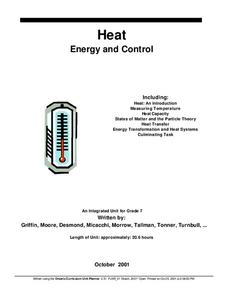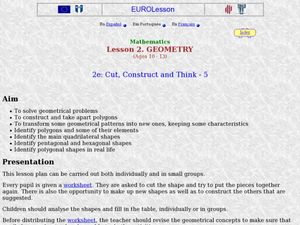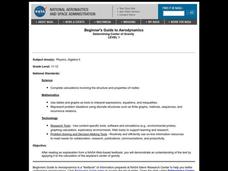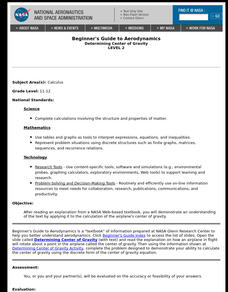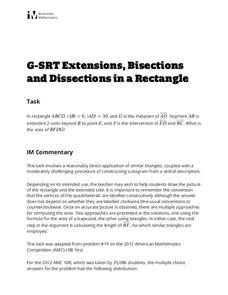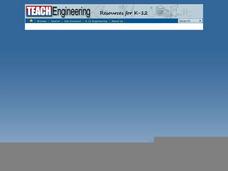Curated OER
Energy and Control
Seventh graders construct a lunch box that maintains functional temperature zones and does not allow heat transfer between the zones. They examine the transfer of heat, the capacity of certain materials to hold heat, and how the...
Curated OER
Addition and Subtraction Pick n Mix 2
Fourth graders practice a wide range of strategies for solving addition and subtraction problems containing decimal fractions. They add and subtract fractions, decimals and integers while generalizing the properties of operations with...
Curated OER
Geometry: Cut, Construct, Think
Young scholars identify the properties of polygons. In this geometry lesson, students cut out shapes try to construct polygons. Young scholars analyze the shapes and fill out a table of characteristics.
Curated OER
Determining Center of Gravity
Students complete calculations involving the structure and properties of matter. They engage in a variety of problem solving activities to help them determine the center of gravity.
Curated OER
Determining Center of Gravity
Learners complete calculus calculations involving the structure and properties of matter and determining the center of gravity.
Curated OER
"Water is Life" Global Water Awareness
Students examine and calculate the percentage of potable water remaining on the earth. In this ecology and geography lesson, students brainstorm the main factors affecting water distribution. Students use mathematical problem solving to...
Curated OER
Food Pyramid Power: Looking Back and Moving Forward
Students show their knowledge of properties of objects as it pertains to sorting and creating patterns. In this food pyramid power lesson, students show their ability to use whole numbers in different representations by appling...
Curated OER
Classifying Polygons
Students study polygons. In this math lesson, students play a game in which they learn the classification system for polygons. Students identify the properties of quadrilaterals.
Curated OER
ENVIRONMENT AND CONSERVATION: JAPAN
Students explain conditions and motivations that contribute to conflict, cooperation, and interdependence among nations; and analyze the causes, consequences and possible solutions to resource allocation, conservation, and economic...
Curated OER
The Price is Right?
Twelfth graders read "A Primer on Gasoline Prices" and complete a worksheet on the price of gas. They discuss supply and demand and what a consumer can do about prices at the pump.
Curated OER
Sampling and Comparing Biodiversity
High schoolers compares the density and distribution differences of four species of spiders in two hypothetical habitats. They "sample" two habitats and then do calculations such as average density and relative distributions to compare...
Curated OER
Food Systems Feed the World
Students discover how getting food from farm-to-fork involves several steps and many hands. In this interactive food chain lesson, students respond to a series of questions about food distribution then work collaboratively to create a...
Curated OER
Cracking the Code
Students explore encoding systems and decoding technology. In this barcoding lesson plan students examine how coding impacts society including distribution, and inventory.
Teach Engineering
Magnetic Materials
The design challenge: develop a method to separate steel from aluminum. The first lesson plan in an eight-part series introduces the class to the grand challenge of ciming up with a method to streamline a sorting process at a...
Pennsylvania Department of Education
Fractional Parts Using an Area Model
Learners explore multiplying fractions and their relationship to parts of a whole. They draw and shade fractional parts to show parts of a whole and fractional parts of a fraction. Pupils also use an Internet site for interactive...
Virginia Department of Education
Scientifically Speaking
Explore the connection between operations with scientific notation and the laws of exponents. Scholars work on a set of word problems involving operations with scientific notation. Along the way, they consider how the laws of exponents...
Mathematics Assessment Project
Applying Angle Theorems
Polygon ... an empty bird cage? After finding the angles of a polygon, young mathematicians use the provided methods to solve the problem in multiple ways.
Illustrative Mathematics
Shortest Line Segment from a Point P to a Line L
One of the hardest skills for many young geometers to grasp is to move beyond just declaring obvious things true, and really returning to fundamental principles for proof. This brief exercise stretches those proving muscles as the...
Teach Engineering
Mechanics of Elastic Solids
Make the connection between Hooke's law and elasticity with an activity that introduces the class to the behavior of elastic materials. The resource defines stress and strain to calculate the modules of elasticity of...
Laboratory for Atmospheric and Space Physics
Growing Up With A Mission
New Horizons began its journey to Pluto in 2006. Ten years later, it continues its mission. In that time, scholars have surely grown, but how much more will they grow by the time New Horizons reaches its destination? Find out with an...
Illustrative Mathematics
Extensions, Bisections and Dissections in a Rectangle
Gaining practice in translating a verbal description into a diagram and then an equation is the real point of this similar triangles exercise. Once the diagram is drawn, multiple methods are provided to reach the conclusion. An effective...
Teach Engineering
Both Fields at Once?
An MRI uses both a magnetic and electricity, so how do the two interact with each other? Class members observe the effects on a charged particle when it is subject to both an electrical and magnetic field. The teacher background...
Illustrative Mathematics
Bank Shot
Young geometers become pool sharks in this analysis of the angles and lengths of a trick shot. By using angles of incidence and reflection to develop similar triangles, learners plan the exact placement of balls to make the shot....
University of Georgia
Splat!
What does viscosity have to do with splatter? An activity shows that the viscosity of a substance is inversely proportional to the distance of its splatter. Learners conduct the experiment by collecting data, graphing, and analyzing...
